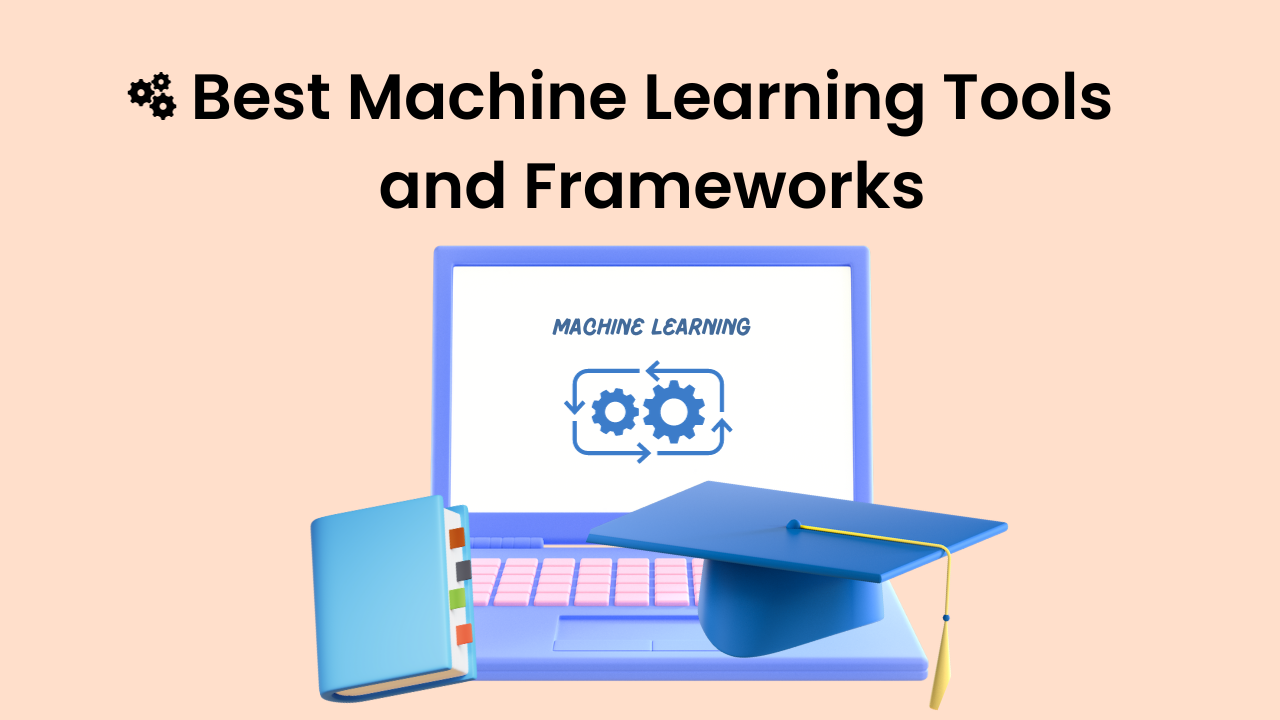Machine learning is an important aspect of modern computing, and it has transformed the way we interact with technology. Machine learning tools and frameworks have made it possible for developers and data scientists to create intelligent applications that can learn and adapt to new situations. In this article, we will explore some of the best machine-learning tools and frameworks that can be used for a variety of applications.
Table of Contents
ToggleThere are Some Machine Learning Tools and Frameworks
1. TensorFlow
TensorFlow is a free, open-source software library for dataflow and differentiable programming across a range of tasks. It is a symbolic math library and is also used for machine learning applications such as neural networks. TensorFlow was developed by the Google Brain team and is widely used in research and industry for a variety of machine learning tasks, including natural language processing, image recognition, and speech recognition. It supports multiple programming languages, including Python, C++, and Java. TensorFlow also includes a wide range of tools for data visualization, model optimization, and deployment.
2. Keras
Keras is an open-source neural network library that is written in Python. It is capable of running on top of TensorFlow, Microsoft Cognitive Toolkit, Theano, or PlaidML. Keras provides a user-friendly API that allows users to easily create, train, and evaluate deep learning models. It is widely used in industry and academia for a variety of machine learning tasks, including computer vision, natural language processing, and speech recognition. Keras is known for its simplicity and ease of use, making it a popular choice for beginners and experts alike.
3. PyTorch
PyTorch is an open-source machine learning framework that was developed by Facebook’s AI research team. It is widely used for building deep learning models for a variety of applications, including computer vision, natural language processing, and speech recognition. PyTorch provides a dynamic computational graph that allows users to define, modify, and debug their models on the fly. It also offers several tools for distributed training, including DataParallel and DistributedDataParallel. Additionally, PyTorch has a strong community of developers and users who contribute to its growth and development.
4. Scikit-learn
Scikit-learn is a free, open-source machine learning library for the Python programming language. It provides simple and efficient tools for data mining and data analysis, making it accessible to both beginners and experts in the field of machine learning. Scikit-learn includes a wide range of classification, regression, and clustering algorithms, as well as tools for model selection, data preprocessing, and dimensionality reduction. The library is built on top of NumPy and SciPy, two popular scientific computing libraries for Python, and is widely used in both academia and industry.
5. Caffe
Caffe is a deep learning framework developed by the Berkeley Vision and Learning Center (BVLC). It is an open-source framework that is used for various applications, such as image and speech recognition, and is especially popular in computer vision tasks. Caffe is written in C++, but it also has a Python interface. It is known for its efficient computation, modularity, and scalability. Caffe has a large community of developers and users, and there are many pre-trained models available for use. Caffe was originally released in April 2014 and has since been used in many research and commercial applications.
6. Theano
Theano is a Python library that allows developers to define, optimize, and evaluate mathematical expressions involving multi-dimensional arrays efficiently. It is built on top of NumPy and was developed primarily by the Montreal Institute for Learning Algorithms (MILA) at the Université de Montréal. Theano provides an easy-to-use interface to define and compute mathematical expressions that can be optimized and run on a range of hardware, including CPUs and GPUs. It is widely used in research and industry for deep learning and other machine learning applications. Theano is no longer actively maintained, and users are encouraged to migrate to other frameworks like TensorFlow or PyTorch.
7. Microsoft Cognitive Toolkit (CNTK)
Microsoft Cognitive Toolkit (CNTK) is an open-source toolkit for deep learning developed by Microsoft Research. It is designed to support distributed learning with parallelism and scalability. CNTK can be used with several programming languages, including Python, C#, and C++. It provides a powerful set of algorithms for training and evaluating deep neural networks and can handle large datasets efficiently. CNTK has been used to build various AI applications, including image recognition, speech recognition, and natural language processing.
8. Apache MXNet
Apache MXNet is an open-source deep learning framework that is designed for efficient and flexible implementation of neural network models. It was developed by the Apache Software Foundation and is used by many companies and organizations for a wide range of applications, such as natural language processing, computer vision, and speech recognition. MXNet supports multiple programming languages, including Python, C++, and R, and can be run on various hardware, such as CPUs, GPUs, and clusters. Its key features include automatic differentiation, dynamic computational graphs, and distributed training.
9. H2O.ai
H2O.ai is an open-source platform for machine learning and artificial intelligence that offers a variety of tools and frameworks for data scientists and developers. The platform is designed to make it easy for users to build, deploy, and manage machine learning models and applications, with a focus on scalability, performance, and ease of use.
H2O.ai provides a number of powerful machine-learning algorithms, including deep learning, gradient boosting, generalized linear modeling, and others. The platform also offers tools for data visualization, data preparation, model training and tuning, and deployment.
One of the key features of H2O.ai is its ability to scale up to large datasets and clusters, making it suitable for use in production environments. The platform also integrates with a wide range of programming languages and data sources, including Python, R, Hadoop, and Spark.
H2O.ai is used by a number of large organizations, including PayPal, Booking.com, and Progressive Insurance, among others. The platform is available as a free, open-source download, as well as through a number of commercial and enterprise versions.
10. Weka
Weka is an open-source machine learning software in Java that provides a collection of algorithms for data mining tasks, including classification, clustering, regression, and feature selection. It also includes tools for data preprocessing, visualization, and model evaluation. Weka has a graphical user interface (GUI) and can be used as a command-line tool as well. It is widely used in both academia and industry and has a large user community. Weka is licensed under the GNU General Public License (GPL) and is freely available for download.
Conclusion
Machine learning is a rapidly growing field, and there are numerous tools and frameworks available to help developers and researchers create and train machine learning models. In this article, we have discussed 10 of the best machine learning tools and frameworks, including TensorFlow, Keras, PyTorch, Scikit-learn, Caffe, Theano, Microsoft Cognitive Toolkit (CNTK), Apache MXNet, H2O.ai, and Weka.
Each of these tools has its own strengths and weaknesses, and the choice of which one to use will depend on the specific requirements of the project. TensorFlow and PyTorch are popular choices for deep learning, while Scikit-learn is a good option for traditional machine learning tasks. Keras is an excellent choice for beginners who want to get started with deep learning quickly, and Weka is a powerful tool for data preprocessing and visualization.
Frequently Asked Questions (FAQs)
Machine learning tools and frameworks are software or platforms that enable developers and data scientists to build and deploy machine learning models efficiently. They provide libraries, APIs, and other resources to simplify the process of creating and training machine learning algorithms.
Some popular machine learning tools and frameworks include TensorFlow, scikit-learn, PyTorch, Keras, and Apache Spark. These tools are widely used for various machine learning tasks, such as data preprocessing, model training, and deployment.
TensorFlow and PyTorch are both deep learning frameworks, but they differ in their approach to building and training neural networks. TensorFlow is known for its scalability and production readiness, while PyTorch is favored for its dynamic computation graph and ease of use.
When selecting a machine learning framework, consider factors such as your project requirements, the complexity of the models you intend to build, the programming language you are comfortable with, community support, and available resources and documentation.
Yes, several user-friendly machine learning tools are suitable for beginners, such as Google’s AutoML, IBM Watson Studio, and Microsoft Azure Machine Learning Studio. These tools often provide intuitive interfaces, prebuilt models, and guided workflows to simplify the machine-learning process for those new to the field.
Interesting Reads:
Top Software Documentation Tools of 2024








